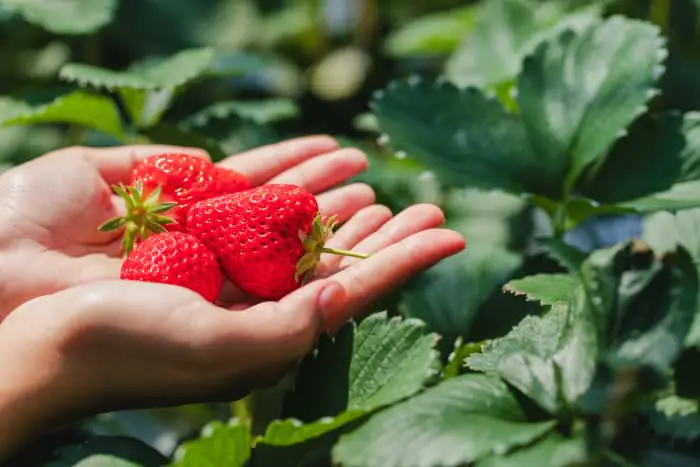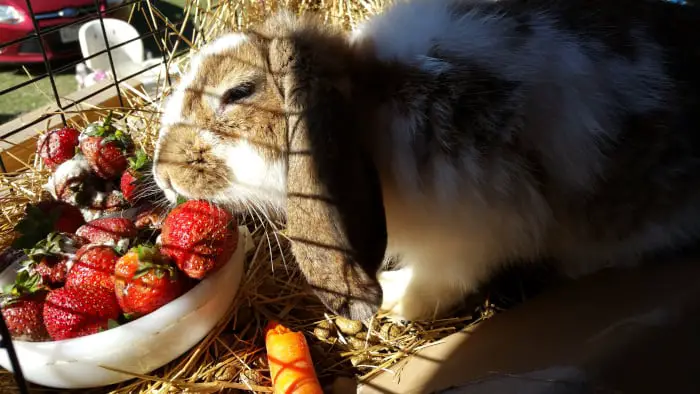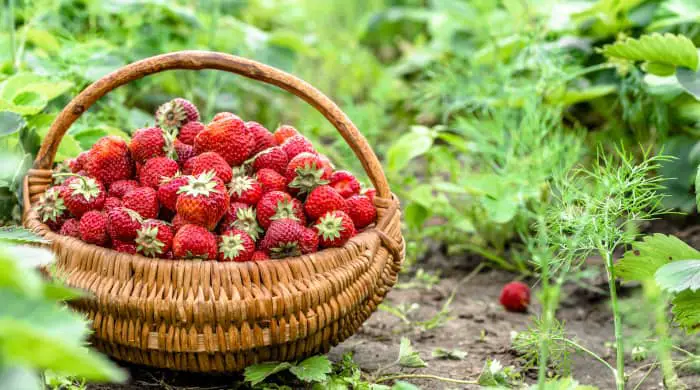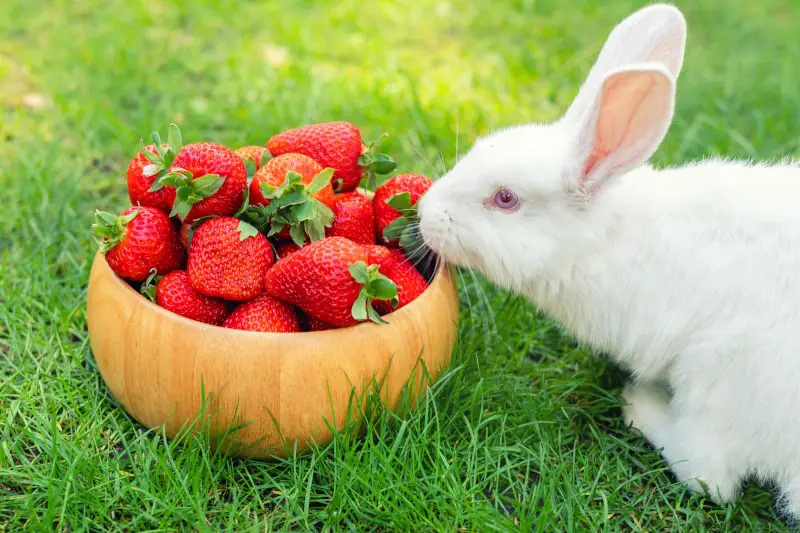Fruits are one of the healthiest and most nutritious foods that exist. Their variety of flavors makes them one of the most popular food groups preferred by young and adults alike. Besides being sweet and tasty, fruits provide a great variety and amount of vitamins and minerals beneficial to our health. With strawberries being so tasty we may be wondering if pet rabbits can eat strawberries.
Strawberries stand out in the fruit group due to their incredible and refreshing taste. These fruits ought not to be missing from our eating routine, as they give innumerable dietary advantages, just as astounding contributions to our wellbeing.
Unfortunately, strawberries are not available all year round. They are seasonal fruits and are more abundant during the summer months. That is why they make the perfect snack to fight the hot summer temperatures. Who wouldn’t like to enjoy a delicious and sweet dish of strawberries on a hot summer day?
But what about our pets? They’d sure love it, too. But will our pet rabbit be able to assimilate and enjoy the taste and benefits of strawberries without any harm?
Can Rabbits Eat Strawberries?
Good news! Your furry little friend can eat strawberries, but only in small amounts and once in a while. Strawberries are safe for rabbits to eat. Your bunny will enjoy a small portion from time to time and will also benefit from all their nutritional properties.
Taking care of your bunny ought to be your primary concern. On this depends how healthy and happy your pet will be. The pampering and care you give your pet rabbit translates into health and well being. You will be giving your pet a high quality of life.
On many occasions, we have emphasized the importance of the feeding regimens of rabbits. These small creatures can devour almost anything. This represents a danger for our bunnies due to the fragility of their digestive system. That’s why we have to pay a lot of attention to their diet.


How Much of This Fruit is Your Rabbit Allowed to Have?
Rabbits cannot eat more than two tablespoons of cut strawberries at a time. A medium-size strawberry is all they can eat. We advise you to be careful and respect this amount as doing otherwise could cause problems for your beloved rabbit.
Remember that fruits contain large amounts of sugar, which may lead to severe intestinal problems if eaten in excess. The same thing applies to strawberries. You should give them only as treats and they should only constitute 5-10% of the rabbit’s daily diet.
How Often Can I Give Strawberries to My Pet Rabbit?
The delicious taste of strawberries will capture your rabbit’s palate, but as rich and healthy as these fruits are, your little friend should not be allowed to eat them every day. We recommended giving them to your pet only once or twice a week.
First of all, you must always remember that a rabbit’s diet should be based mainly on hay and green vegetables. Bunnies don’t need fruits in their diets. Only give them as a sweet or treat to your rabbit, but never to substitute the hay and vegetables diet.
Second, your rabbit does not need to depend on the heavenly taste of strawberries, refusing to eat hay. Feed it strawberries occasionally. Hay and vegetables are better food options for your rabbit as they provide your pet with all the essential nutrients it needs.
What Other Recommendations Should I Follow?
As rabbit owners, we must pay close attention to various issues regarding their primary care. Food is one of the most important aspects which we must take care of due to the fragility of their digestive system. For this reason, we would like to give you some recommendations for feeding them properly. This is of particular importance when we decide to introduce new foods into their diet.
Strawberries, like all fruits, should be thoroughly washed before offering them to your rabbit. Your rabbit can also eat the leaves and strawberry plants. If you’re feeding the plants, don’t forget to wash them too.
Don’t just feed him strawberries. You can offer other varieties of fruit as well. Just make sure to introduce any new foods into your rabbit’s diet slowly and in small amounts.
Watch for any signs of diarrhea. If you notice any changes in its behavior or the consistency of your stool, stop feeding it any kind of treats and do not hesitate to visit your veterinary doctor.
Use a wet wipe to clean your rabbit’s fur after eating these delicious treats. They may become quite messy.
Sadly, despite its great benefits, the commercial growing of strawberries is carried out using many pesticides which can be harmful to the health of your pet.
How to avoid pesticides?
A good option is to buy organic fruits and vegetables which grow free of pesticides, and other toxic chemicals, as these substances cannot be eliminated with washing with water. You can always decide to grow strawberries at home. Strawberries are relatively easy to cultivate and don’t need a lot of space to develop. Besides, it is a fun and satisfying activity.


What is The Nutritional Value of Strawberries?
Strawberries provide a wealth of vitamins and minerals that are of great benefit to the body’s health. These berries have a remarkable mineral richness, making it a highly indicated food in remineralization cures and the treatment of nutritional deficits. These are some of the vitamins and minerals that are most abundant in strawberries:
Vitamins
Strawberries are an excellent source of vitamins. Among these we can highlight the following:
- Vitamin C: an essential nutrient in the human diet. It is the antioxidant par excellence. This vitamin is necessary for the synthesis of collagen, the healing process, the absorption of iron, and the strengthening of the immune system.
- Vitamin B6: participates in the metabolism of proteins and fatty acids, and the formation of hemoglobin and nucleic acids. It also facilitates the release and transportation of glycogen from the liver to the muscles.
- Vitamin B3 or niacin: acts on the energetic metabolism of carbohydrates, amino acids, and lipids.
- Vitamin B2 or riboflavin: is involved in the production of red blood cells and the release of proteins. It is also involved in the maintenance of eye and skin health.
- Vitamin B5: is also known as vitamin W or pantothenic acid. This vitamin is essential for life. It is involved in different stages of lipid synthesis, neurotransmitters, thyroid hormone, and hemoglobin. Also, it helps with tissue regeneration.
- Vitamin B9 or folic acid: intervenes in the production and maturation of structural proteins and hemoglobin.
- Vitamin E: strawberries are also rich in vitamin E, although in less quantity. It promotes fertility and helps keep blood cells stable.
Minerals
Strawberries contain many minerals such as iron, magnesium and to a lesser extent calcium, copper, phosphorus, manganese, potassium, and silicon. It is important to note that strawberries are perfect for people with high blood pressure or heart problems due to their high potassium content and low sodium content.
What Are The Benefits of Eating Strawberries?
In addition to being the preferred snack or dessert of many, strawberries are also a food that provides multiple health benefits. Some studies have suggested that strawberry consumption may help prevent the development of diseases such as some types of cancer and cardiovascular disease, as well as help boost the immune system. These are some of the benefits we can get from strawberries:
- They help reduce the risk of heart attacks due to their high content of flavonoids and polyphenols. Large quantities of ascorbic acid, lecithin, and pectin help decrease bad cholesterol levels. They also help control blood pressure because of its high potassium content.
- They contribute to bone health, thanks to their high content of magnesium, potassium, and vitamin K.
- Strawberries are rich in antioxidants that are very useful for counteracting free radical formation, skin aging, and fight body wear and organic deterioration. It is precisely this antioxidant capacity that makes strawberries a great help against some cancers. Antioxidants such as quercetin, kaempferol, and anthocyanins help decrease the formation of harmful blood clots associated with strokes.


- Strawberries also supply significant levels of Omega 3 fatty acids. We usually tend to associate Omega 3 with fish, but, although it may seem incredible, fish is not the only source of Omega 3. Strawberries are also rich in Omega-3 fatty acids, making them highly recommended for people with high cholesterol levels.
- Strawberries help to lose weight due to its low-calorie content and high nitrate content. Also, their high fiber content helps regulate digestive processes and reduces the feeling of hunger.
- They help to clean and whitening of teeth. and contribute to the maintenance of healthy gums.
- Strawberries are a rich source of salicylic acid, giving it natural anti-inflammatory and anticoagulant properties.
- They improve sight by helping to decrease the risk of macular degeneration.
As we have seen, eating strawberries offers multiple health benefits. They can be just as beneficial to our rabbits. However, we must take into account that if we are going to share the benefits of strawberries with our bunnies, this should be in moderation.
Final Thoughts
Although your rabbit can benefit from all the properties and nutrients available in strawberries, you should not forget that your bunny digestive system is very different from ours.
Rabbits cannot tolerate high concentrations of sugars in their digestive system. Excessive intake of sugar promotes the appearance of harmful bacteria that feed on these sugars producing fermentation. The products of fermentation can lead to serious health problems in the rabbit.
Their digestive systems are very delicate and are not adapted to digest other substances like carbohydrates, dairy products, legumes, and nothing that has high sugar content.
An increase in the frequency of fruit feeding may lead to significant gastrointestinal or weight problems. Your bunny will love the sweet taste of strawberries without a doubt, but these should only be offered occasionally as treats. Moderation is the key.
Instead, you should focus on offering a diet rich in hay and vegetables. These ought to be the fundamental wellsprings of vitality and supplements for your bunny.
The main concern is that your rabbit has a long and healthy life. Only through adequate food can this be achieved.

